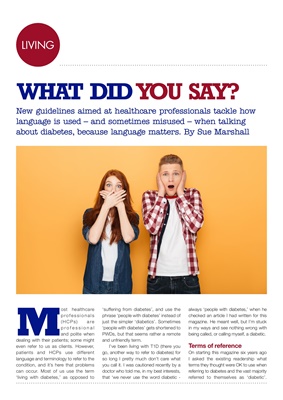
LIVINGLIVING
WHAT DID YOU SAY?
New guidelines aimed at healthcare professionals tackle how
language is used - and sometimes misused - when talking
about diabetes, because language matters. By Sue Marshall
M
ost healthcare
professionals
(HCPs) are
professional
and polite when
dealing with their patients; some might
even refer to us as clients. However,
patients and HCPs use different
language and terminology to refer to the
condition, and it's here that problems
can occur. Most of us use the term
'living with diabetes,' as opposed to
'suffering from diabetes', and use the
phrase 'people with diabetes' instead of
just the simpler 'diabetics'. Sometimes
'people with diabetes' gets shortened to
PWDs, but that seems rather a remote
and unfriendly term.
I've been living with T1D (there you
go, another way to refer to diabetes) for
so long I pretty much don't care what
you call it. I was cautioned recently by a
doctor who told me, in my best interests,
that 'we never use the word diabetic -
always 'people with diabetes,' when he
checked an article I had written for this
magazine. He meant well, but I'm stuck
in my ways and see nothing wrong with
being called, or calling myself, a diabetic.
Terms of reference
On starting this magazine six years ago
I asked the existing readership what
terms they thought were OK to use when
referring to diabetes and the vast majority
referred to themselves as 'diabetic'.